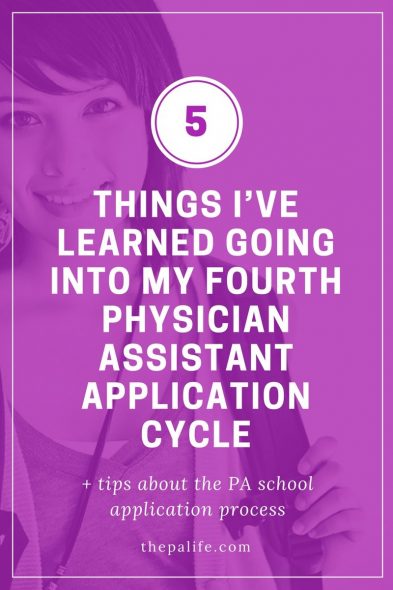Many of life's failures are people who did not realize how close they were to success when they gave up - Thomas Edison
 I will be honest; this is not an article I ever thought I’d be writing.
I will be honest; this is not an article I ever thought I’d be writing.
I submitted my first PA school application immediately after finishing my undergrad, and here I am, three years later, preparing to submit my fourth PA application when the cycle starts at the end of the month.
The PA application process has been grueling and defeating at times, a truth that isn’t mentioned enough on Pre-PA forums or educational websites.
They say experience is the best teacher, and with three years of PA school applications under my belt, I’d say I’m seasoned enough to provide some insight.
Below are five things I’ve learned about the PA application process.
1. Take the Application Seriously
If you’re a Pre-PA, you’ve definitely heard of CASPA (Centralized Application Service for Physician Assistants). Stephen compares CASPA to Amazon because it gives admission directors a friendly platform for assessing and reviewing PA applicants.
CASPA isn’t just the platform PA programs use to compare candidates; it’s also the same one you’ll use to submit your PA application.
You should definitely spend time inside CASPA well before the application cycle starts. Learn how to maneuver the system and especially understand the instructions before submitting an application because once you submit your application, there are some things that cannot be changed.
Taking the application seriously will greatly increase your chances of landing an interview. I was a bit naïve when I first applied through CASPA in 2014. One of the mistakes I made during my first application was not submitting it as early as possible.
Many PA programs look at applications on a rolling basis, meaning they review applications as soon as they are received. The longer you delay submitting your PA application, the fewer open seats there are.
CASPA opens in April, and I didn’t submit my application until August. To put this into some perspective, by August last year, I already completed two personal interviews with interested PA programs. Thus, by not taking the application more seriously in my first year, I set myself up to fail.
2. Research Schools Before Applying

Another tip for PA applicants is to research schools well before the application cycle begins. In fact, I’d recommend looking at schools at least a year in advance.
Why?
Well, many PA programs have unique requirements for candidates.
For instance, one program might accept online science lab prerequisites while another might not. Other variations between programs could include:
- Minimum GPA requirements: some require 3.2 (11 schools), others 3.0 (80 schools) or 2.8 (4 schools)
- Minimum GRE scores
- Timeframe for pre-requisites to be completed (Fall before application cycle)
- Expiring prerequisite credits (some programs require credits earned for prerequisite courses to be within the last 5, 7, or 10 years)
Because the PA program is so competitive, it’s important that you have as many viable options as possible when you apply for programs. If you research programs and understand the minimum requirements for the schools you are most interested in, you have a year to fulfill any requirement that you have outstanding.
I learned this lesson the hard way after realizing during my first application that I needed to increase my GPA and take additional science courses so that I could become a more competitive applicant and meet the requirements for more PA programs.
3. Get Patient Care Hours
Stephen does a great job breaking down the importance of healthcare experience, but in a nutshell, very few programs in the country require no healthcare experience whatsoever.
I worked as a pharmacy tech for many years and still do, which can count as “other healthcare experience,” depending on the program. However, to improve my application, I decided to get direct patient care experience which is substantially more valuable to PA programs.
I spent two weeks studying on my own for the CNA exam. Once I passed the exam, I found a job at a local hospital as a nurse technician. Not only does direct contact patient care experience improve your chances of getting into an interview, but it also helps you validate your decision to become a physician assistant.
While schools do have minimum thresholds for healthcare experience, there is no ceiling. In fact, there is evidence that supports a direct relationship between more healthcare experience and acceptance into PA school. If you want to increase your chances of getting accepted, become a CNA, EMT, or other position where you are directly responsible for a patient’s care.
4. Stand Out

This sounds cliché just typing it, but the reality is that PA applicants who find a way to stand out will improve their chances of landing an interview and, ultimately, getting a seat in a program.
The PA profession is growing more competitive every year. This once little-known profession now continuously ranks as one of the best jobs in America.
Even though thousands of applicants are vying for a handful of seats, there are still opportunities to stand out. You just have to be willing to put in the extra work or go outside your comfort zone.
Standing out starts with the application.
Because time machines don’t exist, many students cannot immediately increase their GPA or easily work a thousand extra hours at their healthcare job. Thus, they end up hitting minimum requirements but not much more.
Fortunately, CASPA allows students to diversify themselves with letters of reference and a personal statement. In fact, the personal statement may be the single most important part of your application.
Don’t take my word for it, though, Stephen believes that his 600-word Physician Assistant essay was the reason he was accepted into PA school.
I have made countless tweaks and updates to my statement. I shared it with friends, other PA students, and complete strangers so that I can get as much feedback and constructive criticism as possible. Don’t be afraid to open up and be vulnerable in your statement. It’s your chance to stand out from the crowd – don’t underestimate the value of a strong personal statement.
I also have to mention that standing out doesn’t begin and end with the essay. If you land an interview, be ready to make a strong impression. My previous interviews involved a group of 10-30 other students and me. There is a combination of one-on-one interviews and group interviews, depending on the program. Regardless of the structure or amount of competition at your interview, you have to leave a lasting memory.
The best way I’ve found to stand out is to practice a lot before the interview. The more comfortable you are with the potential questions, the more relaxed and confident you’ll be in the interview. Just be careful not to sound rehearsed. Practice doesn’t mean memorizing!
5. It’s Not Going to Be Easy

Finally, the last tip I have for those of you considering PA school is to prepare for a tough road. Granted, some students will get in with ease on their first application (I hate you!), but for every one of those, there are a dozen others that don’t receive an interview or are put on a waiting list or rejected. I don’t say this to discourage you, I say this to help you realize that if you truly want to be a PA, then you will take the hurdles and struggles along the way as motivation and lessons, I know I sure have.
I’m going to tell you a really honest and vulnerable story about my last application cycle. I was invited to an interview for a PA program that was pending accreditation. Now, if you’re not familiar with the ‘pending achieving accreditation’ status, don’t worry, neither was I at first. Basically, this program was awaiting final accreditation from ARC-PA, which is the governing body that oversees the standards and regulations of PA programs in the U.S.
At the time, I was just ecstatic to receive an invitation and didn’t think twice. About a month after the interview, I received a phone call that would change my life forever. At least, that is what I thought. I was accepted into the program.
The plan was to start January ’17 following earning provisional accreditation status at the end of 2016. However, several months later, we received word that the accreditation status was on hold and that we wouldn’t start in January, as we had hoped.
The status was deferred, which meant that we’d hear something in March, with a realistic chance of starting the program sometime in the middle of the year. March came, and the news was not good.
The program's accreditation was withdrawn. After spending the better part of eight months in limbo, the other accepted students and I were back to square one. My label as an active PA student was gone in one fell swoop.
This story is just one of the many obstacles I’ve faced on my road to becoming a PA. There are countless other stories of challenges and hurdles that other students have faced far worse than mine. If you glean anything from my experience, it should be that becoming a PA can be a long and challenging road, mentally, emotionally, and financially.
If you’re passionate and driven to be a PA, then you won’t let anything get in your way. The road will not be the same for everyone, and hopefully, you can turn your obstacles into a learning experience.
So, here I am – a seasoned PA applicant with three years under my belt, ready to take on the application process once again. While I’m guaranteed to make mistakes again this time around, I’ve certainly come a long way from 2014. If you’re considering PA school, I hope you’ll take heed of the advice above when applying.
Action Steps:
Here are three action steps that you can implement today:
1. Master the Application Process: Make sure to familiarize yourself with CASPA (Centralized Application Service for Physician Assistants), the platform used by most PA programs to review applicants. Spend time understanding the system and its instructions. Submit your application as early as possible (here is a helpful timeline), as many programs review applications on a rolling basis. Your application should reflect the seriousness and dedication you bring to the profession.
2. Thoroughly Research Potential Schools: Begin researching PA programs at least a year in advance. Every program has unique requirements, and understanding these in advance will help you prepare effectively. Look into the GPA requirements, prerequisite coursework, HCE requirements, and any other specific criteria that schools require. Make sure you meet all these requirements to widen your range of options and increase your competitiveness.
3. Gain Patient Care Experience: Seek opportunities to gain direct patient care experience. Such experience not only improves your chances of landing an interview but also confirms your commitment to the profession. Working as a Certified Nursing Assistant (CNA), Emergency Medical Technician (EMT), or in a similar role will provide valuable hands-on experience and make your application more attractive.
Remember, the PA application process may be challenging and competitive, but with perseverance and dedication, success is attainable.
Written by:
Vanessa Alvarez – Vanessa is an aspiring PA student with a background as a Pharmacy Technician and Certified Nursing Assistant. She hopes to start PA school in 2018.
Do you have something you would like to publish on thepalife.com website? If so, just drop me a line at [email protected]
View all posts in this series
- My PA School Interview: The Journey of a Lifetime
- How to Write the Perfect Physician Assistant School Application Essay
- The Top 46 Physician Assistant Applicant Interview Questions
- Use this Interview Hack to Get The Physician Assistant Job of Your Dreams!
- The Physician Assistant Job or PA School Interview – Email Etiquette
- The Physician Assistant Interview: Thank You and Follow-up (With Sample)
- The Physician Assistant Essay and Personal Statement Collaborative
- Do You Recognize These 7 Common Mistakes in Your Personal Statement?
- 7 Essays in 7 Days: PA Personal Statement Workshop: Essay 1, “A PA Changed My Life”
- PA Personal Statement Workshop: Essay 2, “I Want to Move Towards the Forefront of Patient Care”
- PA Personal Statement Workshop: Essay 3, “She Smiled, Said “Gracias!” and Gave me a Big Hug”
- PA Personal Statement Workshop: Essay 4, “I Have Gained so Much Experience by Working With Patients”
- PA Personal Statement Workshop: Essay 5, “Then Reach, my Son, and Lift Your People up With You”
- PA Personal Statement Workshop: Essay 6, “That First Day in Surgery was the First Day of the Rest of my Life”
- PA Personal Statement Workshop: Essay 7, “I Want to Take People From Dying to Living, I Want to Get Them Down From the Cliff.”
- Physician Assistant Personal Statement Workshop: “To say I was an accident-prone child is an understatement”
- 9 Simple Steps to Avoid Silly Spelling and Grammar Goofs in Your PA School Personel Statement
- 5 Tips to Get you Started on Your Personal Essay (and why you should do it now)
- How to Write Your Physician Assistant Personal Statement The Book!
- How to Write “Physician Assistant” The Definitive PA Grammar Guide
- A Look Inside Two PA School Interviews
- 101 PA School Admissions Essays: The Book!
- 5 Things I’ve Learned Going Into My Fourth Physician Assistant Application Cycle
- 7 Tips for Addressing Shortcomings in Your PA School Personal Statement
- 300 PA School Interview Questions You Should Be Ready to Answer
- PA School Mock Interviews: Prepare with a LIVE, Recorded Video Interview
- The #1 Mistake PRE-PAs Make on Their Personal Statement
- The Ultimate PA School Personal Statement Starter Kit
- The Ultimate Guide to CASPA Character and Space Limits
- Mock Physician Assistant School Interview With Taylor Hill Pre-PA
- Mock PA School Interview With Pre-PA Lily Boyle
- 10 Questions Every PA School Personal Statement Must Answer
- 5 PA School Essays That Got These Pre-PAs Accepted Into PA School
- 7 Questions to Ask Yourself While Writing Your PA School Personal Statement
- The Interview That Got This Pre-PA Into 5 PA Schools
- 101 PA School Applicants Answer: What’s Your Greatest Strength?
- Mastering Your PA School Interview: Tone Matters
- The Worst PA School Interview Question Ever!
- 12 Secrets to Writing an Irresistible PA School Personal Statement
- 7 Rules You Must Follow While Writing Your PA School Essay
- You Have 625 Words and 2.5 Minutes to Get Into PA School: Use Them Wisely
- What’s Your #1 Personal Statement Struggle?
- 31 (NEW) CASPA PA School Personal Statement Examples
- Why Choose PA Over NP? Here’s the Perfect Answer
- Don’t Make This Critical PA School Interview Mistake!
- 5 Best Ways to Give a Memorable PA School Interview
- 3 Things to Do the Night Before Your PA School Interview
- How to Prepare for Your PA School Interview Day Essay
- Should You Write Physician Associate or Physician Assistant on Your PA School Essay?
- Meet the World’s Sexiest PA School Applicants
- How to Squash PA School Interview Day Stress (4 Simple Steps)
- PA School Reapplicants: How to Rewrite Your PA School Essay for Guaranteed Success
- How to Write a Personal Statement Intro that Readers Want to Read
- PA School Reapplicant Personal Statement Checklist
- How to Deal with Bad News in Your Personal Statement
- Inside Out: How to use Pixar’s Rules of Storytelling to Improve your PA Personal Statement
- Ratatouille: A Pixar Recipe for PA School Personal Statement Success
- Personal Statement Panel Review (Replay)
- Mind Mapping: A Tool for Personal Statements, Supplemental Essays, and Interviews
- Start at the End: Advice for your PA School Personal Statement
- Here’s What a REAL PA School Interview Looks Like (in 2024)
- My PA School Interview Preparation Strategy
- How to Bring Your Best on PA School Interview Day
- How to Cope with PA School Application Rejection
- ChatGPT Answers the Top 46 PA School Applicant Interview Questions
- Why Our Program? How to Answer This Common Supplemental Essay and Interview Question
- What is a PA? How to Nail This Not-So-Easy Interview Question
- How to Answer Behavioral Questions in Your PA School Interview















Thank you SO much for sharing your story. When I got out if undergrad, I had entirely wrong expectations about the ease of getting into PA school. My expectations are slowly, painfully changing. Hearing your story is very valuable to me because it’s a realistic road that most PA applicants are on. Thank you.
Thank you for sharing. I graduated undergrad in 2014 as well, but with the hopes of becoming a Pharm D. So I got myself a job at a pharmacy to gain experience and have been working since. It wasn’t until last year where I realized I wanted to do PA and so I’ve been trying to get all my pre-reqs done. I have two more, but little experience.
I’m going to see about shadowing an MD I know soon, and the only realize why I haven’t switched jobs yet is because I don’t have a specific license (everything needs a degree now like medical assisting and clinical trials associate) . I haven’t put much thought in being a CNA because I thought you had to go to school for that. My pharmacy job pays well and I’m struggling paying rent and student loans every month so I can’t quit my job which is full time.
I’ve been scared to do an application, but I’m gonna see about submitting one in 2018. So I have various goals to achieve until then. But again thank you again for the article.
Thank you for sharing. I am will be on my third try next year and I agree the road to PA school is tough. I could not imagine how it must have felt to finally get an acceptance and then having to start the application process all over again. However, it will all be worth it in the end.
Did it really take you to the third application cycle to learn that you needed to take the application seriously, that direct PCE is useful, and that you should research the schools you’re applying to? w.o.w.
I think this comment is a bit trollish, but there’s also a lot of truth in it. Is the author a PA yet? With all due respect, maybe it’s time for her and others like her to find something else to do with their precious lives. I wonder what their family and friends say? Who is giving her advice and looking out for her best interest? Be principled about sticking to your core competencies rather than staying a perpetual course of worsening delusion. Like many careers, the PA path is simply not for everyone! The numbers are unforgiving and in some cases, especially stacked against you if you don’t represent a demographic profile. A 4-year track record of non-acceptance speaks volumes about insurmountable obstacles at best and a serious lack of competency relative to the field at worst. I don’t mean to diminish the untold struggles or hardships the author has had to overcome in her life, but this type of article is only useful to the general population in a way that Aesop’s fables teaches children about the consequences of poor choices. Failure is part of success, but so is risk management. For most people there’s a steepening financial and personal opportunity cost involved with committing another year to applying. Then there’s 2.5 years of study and debt to get through. Then many years of debt repayment. All doing what you love, right? Hardly. Even being a doctor in a high-paying specialty is, at the end of the day in many cases, just a job. Instead, find something you’re good at and with the same effort you’re putting into PA school, live out your full potential and make money now while you’re at it. Life is too short to be settling for a career reserved for only the most competitive applicants who fit these programs’ whims. And most it exists outside of the bubble of modern medicine.
There’s a very real possibility that it’s not down to incompetency and moreso down to the interview. It’s very easy to get to that stage and choke just because of the pressure. It happens to a lot of students, even with adequate preparation.
There were many people in my PA class that took 3 and 4 application cycles to be accepted. My best friend in the class took three cycles, and she had over a 3.8 GPA in the PA program. Another graduated with a perfect 4.0 from PA school. Please don’t be discouraged; you can do this.
Thank you for the words of encouragement!
Stephen
Physician Assistants are taught under the medical model. Meaning their learning is inline with that of a physician. Nurse Practicioners are taught nursing which is very different and many of these advance degrees APRN, DNP etc are obtained online with little clinical and real life experience. As an MD who has precepted both, I can honestly say there is a vast difference in the breadth of knowledge and capablity between PAs and NPs. Quite frankly, I feel it’s insulting to compare the 2 professions. Nurses, with their numbers and union backing have created this inflated role with very substandard metrics. It’s scary and actually unsafe, that NP’s are allowed to prescribe and run practices without much medical knowledge or clinical training. There needs to be more regulation in this industry for the patients sake
Solid advice. Thanks for the shoutout to the reddit pre-PA forum! I am going to update the FAQ there to mention some things you say are lacking.
Wonderful, thanks Ben. I love the reddit pre-PA forum. Are you administrator?
Stephen